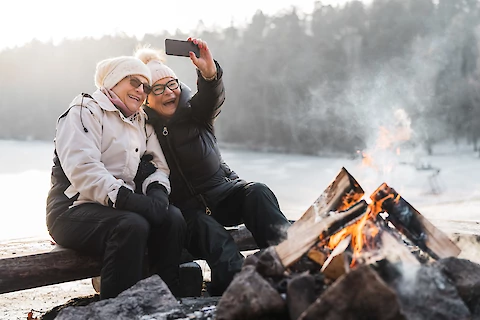
Winter brings distinct challenges, particularly for our senior relatives and those caring for them. The biting cold, icy pavements, and the daunting task of snow removal can pose significant risks to their safety and well-being. For family members serving as caregivers, it's crucial to be well-prepared to face these challenges effectively. Let’s explore winter safety essentials and best practices to ensure your loved one remains safe and secure throughout the colder months.
Understanding the Risks of Winter for Seniors
A crucial aspect of winter safety essentials is understanding the potential risks seniors face in the colder months. Hypothermia is a common worry, where the body's temperature drops dangerously low due to prolonged exposure to cold. Slips and falls are also more frequent in winter due to slick ice and snow-covered surfaces. Many seniors may also risk injury or exhaustion from shoveling snow without proper safety measures.
Preventing Hypothermia
Ensuring seniors are safe from hypothermia starts within the home. Maintaining an appropriate room temperature, generally between 68-70°F, is essential. As we age, our bodies find it harder to regulate temperature, requiring a warmer ambient temperature.
Another critical component is dressing in layers. Layering provides flexibility, making it easier to adjust your clothing depending on the indoor or outdoor temperature. Encourage your senior to wear warm undergarments, insulating layers, and a weather-resistant outer layer. Remember that keeping dry is equally essential to combat hypothermia. Wet clothes can quickly lower body temperature, making older adults susceptible to hypothermia even in mild weather.
Reducing the Risk of Slips and Falls
With its icy surfaces, winter weather increases the chance of slips and falls. Recommended winter safety essentials to counter this include sprinkling deicer or sand on walkways. This ensures driveways are free from snow and debris.
Footwear also plays a vital role. Non-slip shoes with good grip can help seniors navigate slippery surfaces safely. Moreover, older adults who use walking aids should outfit them with appropriate winter attachments to ensure better stability.
Safe Snow Removal Practices
Snow removal might seem like an invigorating exercise. However, it can pose a significant health risk for seniors. Encourage senior loved ones to avoid the task entirely or limit their effort and time. Instead, consider hiring a professional snow removal service to clear the driveways and walkways. In cases where this isn't possible, use ergonomically designed tools for the task.
Regular Check-ins During Winter
Checking in with your senior loved ones is an opportunity to ensure they are warm and comfortable. Whether in person or via phone, these touchpoints are crucial in recognizing early signs of a problem and remedying it before it escalates.
When visiting, check the room temperature, the state of their winter clothing, their physical condition, and their general mood and well-being. Watch for signs of depression, as winter can often lead to a condition called Seasonal Affective Disorder (SAD), a type of depression that happens in the colder months.
Get Support From Senior Helpers Chicago/Evanston
Winter can pose several risks for seniors. However, the right winter safety essentials and precautions will ensure a safe and comfortable winter for your senior loved ones.
At Senior Helpers Chicago/Evanston, we understand the unique safety needs of seniors during the winter season and beyond. If you're in Chicago or Cook County, let us assist and provide professional care to your senior family members. Contact us today to learn more about our range of senior care services.